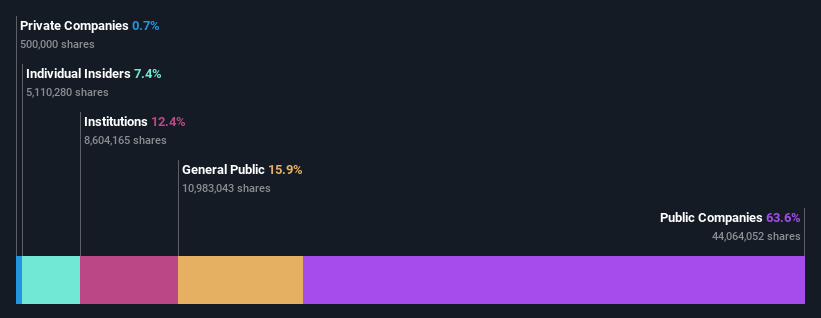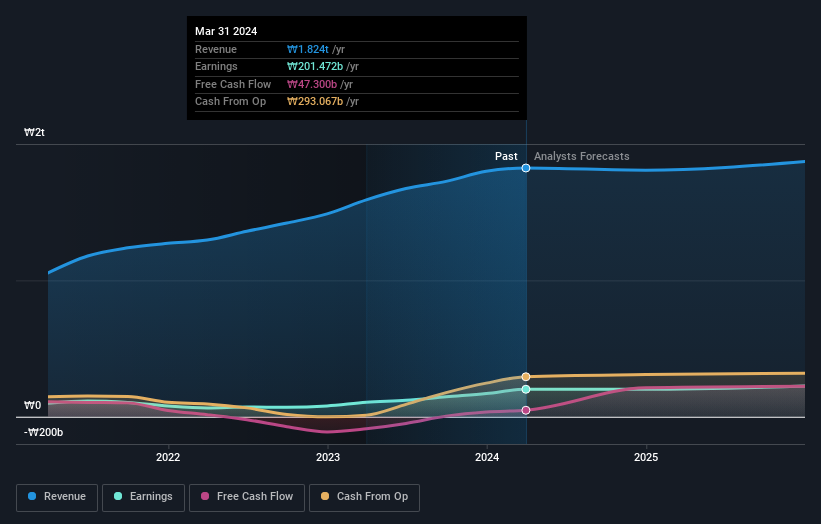- South Korea
- /
- Basic Materials
- /
- KOSE:A300720
Public companies are Hanil Cement Co., Ltd.'s (KRX:300720) biggest owners and were rewarded after market cap rose by ₩87b last week

Key Insights
- The considerable ownership by public companies in Hanil Cement indicates that they collectively have a greater say in management and business strategy
- 64% of the company is held by a single shareholder (Hanil Holdings Co., Ltd.)
- Institutions own 12% of Hanil Cement
To get a sense of who is truly in control of Hanil Cement Co., Ltd. (KRX:300720), it is important to understand the ownership structure of the business. With 64% stake, public companies possess the maximum shares in the company. That is, the group stands to benefit the most if the stock rises (or lose the most if there is a downturn).
Clearly, public companies benefitted the most after the company's market cap rose by ₩87b last week.
Let's take a closer look to see what the different types of shareholders can tell us about Hanil Cement.
View our latest analysis for Hanil Cement

What Does The Institutional Ownership Tell Us About Hanil Cement?
Institutions typically measure themselves against a benchmark when reporting to their own investors, so they often become more enthusiastic about a stock once it's included in a major index. We would expect most companies to have some institutions on the register, especially if they are growing.
Hanil Cement already has institutions on the share registry. Indeed, they own a respectable stake in the company. This can indicate that the company has a certain degree of credibility in the investment community. However, it is best to be wary of relying on the supposed validation that comes with institutional investors. They too, get it wrong sometimes. It is not uncommon to see a big share price drop if two large institutional investors try to sell out of a stock at the same time. So it is worth checking the past earnings trajectory of Hanil Cement, (below). Of course, keep in mind that there are other factors to consider, too.

Hanil Cement is not owned by hedge funds. Looking at our data, we can see that the largest shareholder is Hanil Holdings Co., Ltd. with 64% of shares outstanding. This essentially means that they have extensive influence, if not outright control, over the future of the corporation. In comparison, the second and third largest shareholders hold about 5.1% and 4.3% of the stock.
While it makes sense to study institutional ownership data for a company, it also makes sense to study analyst sentiments to know which way the wind is blowing. While there is some analyst coverage, the company is probably not widely covered. So it could gain more attention, down the track.
Insider Ownership Of Hanil Cement
The definition of an insider can differ slightly between different countries, but members of the board of directors always count. The company management answer to the board and the latter should represent the interests of shareholders. Notably, sometimes top-level managers are on the board themselves.
Insider ownership is positive when it signals leadership are thinking like the true owners of the company. However, high insider ownership can also give immense power to a small group within the company. This can be negative in some circumstances.
Shareholders would probably be interested to learn that insiders own shares in Hanil Cement Co., Ltd.. In their own names, insiders own ₩79b worth of stock in the ₩1.1t company. Some would say this shows alignment of interests between shareholders and the board. But it might be worth checking if those insiders have been selling.
General Public Ownership
The general public-- including retail investors -- own 16% stake in the company, and hence can't easily be ignored. This size of ownership, while considerable, may not be enough to change company policy if the decision is not in sync with other large shareholders.
Public Company Ownership
It appears to us that public companies own 64% of Hanil Cement. This may be a strategic interest and the two companies may have related business interests. It could be that they have de-merged. This holding is probably worth investigating further.
Next Steps:
It's always worth thinking about the different groups who own shares in a company. But to understand Hanil Cement better, we need to consider many other factors. To that end, you should be aware of the 1 warning sign we've spotted with Hanil Cement .
If you are like me, you may want to think about whether this company will grow or shrink. Luckily, you can check this free report showing analyst forecasts for its future.
NB: Figures in this article are calculated using data from the last twelve months, which refer to the 12-month period ending on the last date of the month the financial statement is dated. This may not be consistent with full year annual report figures.
Valuation is complex, but we're here to simplify it.
Discover if Hanil Cement might be undervalued or overvalued with our detailed analysis, featuring fair value estimates, potential risks, dividends, insider trades, and its financial condition.
Access Free AnalysisHave feedback on this article? Concerned about the content? Get in touch with us directly. Alternatively, email editorial-team (at) simplywallst.com.
This article by Simply Wall St is general in nature. We provide commentary based on historical data and analyst forecasts only using an unbiased methodology and our articles are not intended to be financial advice. It does not constitute a recommendation to buy or sell any stock, and does not take account of your objectives, or your financial situation. We aim to bring you long-term focused analysis driven by fundamental data. Note that our analysis may not factor in the latest price-sensitive company announcements or qualitative material. Simply Wall St has no position in any stocks mentioned.
About KOSE:A300720
Hanil Cement
Produces and sells cements, ready-mixed concretes, and admixtures.
Undervalued with solid track record.

